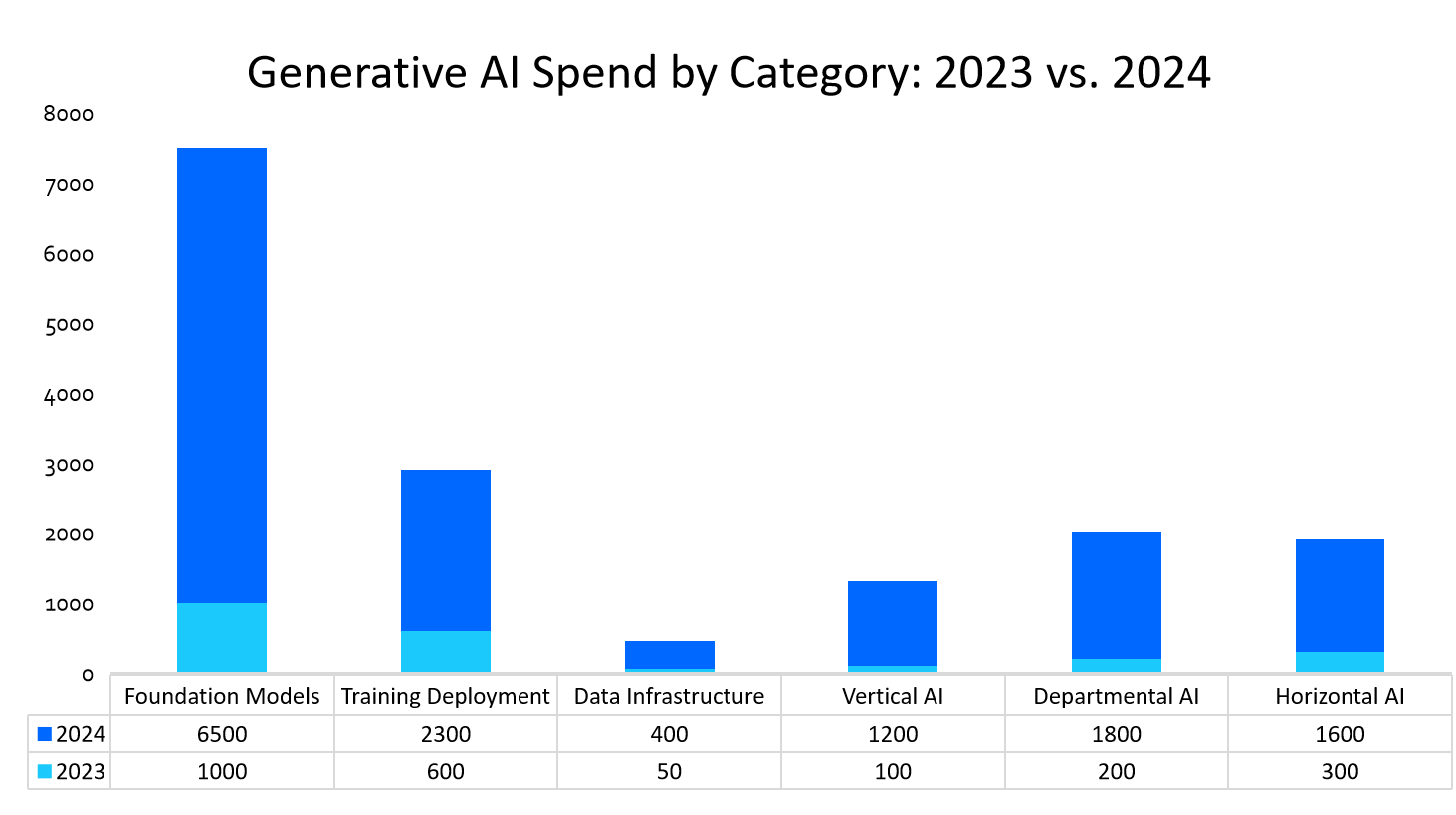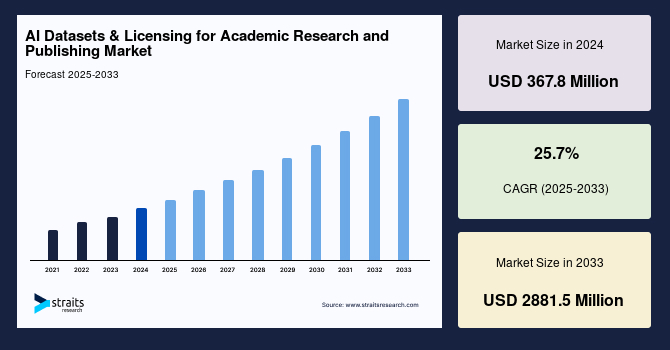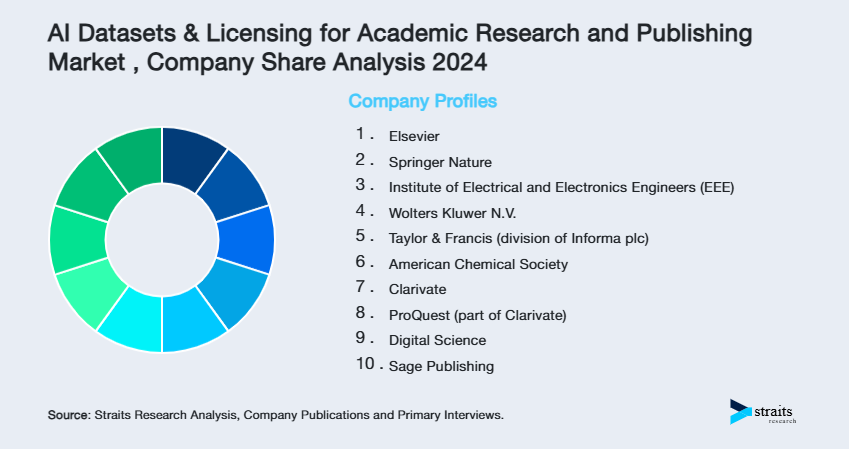AI Datasets & Licensing for Academic Research and Publishing Market Size, Share & Trends Analysis Report By Application (Training, Fine Tuning, Retrieval-augmented Generation (RAG), Inference), By Customer Type (Large Language Model (LLM) Builders, Application Developers, Enterprises, Research Institutions & Academia), By Licensing Type (Proprietary Licensing, Subscription-based, Open Access and Public Licensing, Usage-based Licensing, Custom/Enterprise Licensing), By End Use (Life Sciences and Pharmaceuticals, Health Sciences, Food Science, Chemistry, Engineering, Material Science, Others) and By Region (North America, Europe, APAC, Middle East and Africa, LATAM) Forecasts, 2025-2033
Ai Datasets & Licensing for Academic Research and Publishing Market Size
The global AI datasets & licensing for academic research and publishing market size was worth USD 367.8 million in 2024 and is estimated to reach an expected value of USD 462.32 million in 2025 to USD 2881.5 million by 2033, growing at a CAGR of 25.7% during the forecast period (2025-2033).
AI datasets are structured or unstructured data used to train, validate, and test artificial intelligence models in various domains, such as natural language processing, computer vision, and machine learning. Licensing for academic research and publishing governs the use of such datasets, ensuring compliance with intellectual property laws, ethical considerations, and data privacy regulations. Open-access datasets often have permissive licenses like Creative Commons (CC) or Open Data Commons (ODC), while proprietary datasets may require specific agreements. Proper licensing ensures researchers can legally use and share data while respecting contributors' rights and maintaining transparency in AI development.
The global market is increasing due to the demand for quality AI datasets and transparent licensing agreements. This expansion is driven by the growing need for comprehensive datasets for training AI models, particularly in academic research. The collaborations of universities, tech companies, and research institutions improve access to datasets and the licensing framework. Researchers need varied data for the high accuracy of AI, while innovation in AI predictive analytics and blockchain ensures better security and reliability in licensing data. Academic institutions and researchers seek diverse and comprehensive data sources to enhance the accuracy and reliability of their AI applications. Innovations such as AI-based predictive analytics and blockchain-based transparency solutions are improving data security and providing even more reliable approaches to data licensing. Government policies and legal architectures have also been updated to support growing AI research and development.
The Below depicts a sharp rise in generative AI spending across categories from 2023 to 2024, primarily through foundation models and training deployment. This trend is brought about by the increasing demand for high-quality AI datasets and licensing in academic research and publishing for these institutions to acquire strong data infrastructure and vertical AI solutions to achieve increased model accuracy and innovation in scholarly applications.

Source: Menlo Ventures, Straits Research
Exclusive Market Trends
Expansion of Public Domain Ai Training Datasets
There is a significant surge in the release of public domain datasets aimed at democratizing AI research. Harvard University, funded by Microsoft and OpenAI, unveiled a comprehensive dataset comprising nearly one million public-domain books from the Google Books project. This initiative provides researchers access to many texts, including works by Shakespeare and Dickens, and diverse materials like Czech math textbooks and Welsh dictionaries.
- For instance, in 2024, Harvard's Library Innovation Lab launched the Institutional Data Initiative, which will provide public domain materials from Harvard Law School Library and other institutions. The goal is to make these resources available for training AI and advancing research capabilities.
Ethical and Legal Scrutiny in Ai Data Usage
The ethical use of data in AI training has come under heightened scrutiny. Notably, wildlife photographer Tim Flach discovered that his images were included in datasets used by AI researchers without his consent, allowing commercial AI companies to replicate his work without paying royalties. This situation has raised concerns about the unauthorized use of copyrighted content in AI training.
- For instance, in 2024, The UK government announced a consultation on creating a copyright and AI framework that fosters human creativity and innovation. This move is designed to provide legal certainty, leading to sustained growth in both the creative and AI sectors.
Market Summary
| Market Metric | Details & Data (2024-2033) |
|---|---|
| 2024 Market Valuation | USD 367.8 Million |
| Estimated 2025 Value | USD 462.32 Million |
| Projected 2033 Value | USD 2881.5 Million |
| CAGR (2025-2033) | 25.7% |
| Dominant Region | North America |
| Fastest Growing Region | Asia Pacific |
| Key Market Players | Elsevier, Springer Nature, Institute of Electrical and Electronics Engineers (EEE), Wolters Kluwer N.V., Taylor & Francis (division of Informa plc) |

to learn more about this report Download Free Sample Report
Global Ai Datasets & Licensing for Academic Research and Publishing Market Growth Factors
Collaborative Initiatives between Academia and Industry
Collaborations between academic institutions and industry players are fostering the sharing and licensing of datasets. Such partnerships enable academia to access unavailable proprietary datasets while the industry benefits from academic insights and research outcomes. These collaborations facilitate the development of cutting-edge AI technologies and provide researchers with real-world applications to validate their findings.
- For instance, in 2024, Wiley and Taylor & Francis have partnered with tech companies to give them access to academic content and data for training AI models. This step is seen as a way of promoting innovation. Tech companies such as Microsoft paid Informa, Taylor & Francis' parent company, USD 10 million to enhance AI systems' relevance and performance using this content.
Regulatory Developments and Standards Implementation
The evolving regulatory environment concerning data privacy and usage influences AI datasets and the licensing market. Additionally, establishing industry standards for dataset licensing promotes transparency and trust, encouraging more entities to participate in data sharing and licensing. The DPA's release of a comprehensive position paper on AI data licensing in 2024 exemplifies efforts to establish clear guidelines in this domain.
- For instance, in July 2024, the Copyright Clearance Center (CCC) introduced a collective licensing solution for organizations to ensure compliance when using data providers' content in AI systems. It is integrated into CCC's Annual Copyright Licenses, thus becoming the first solution that offers AI re-use rights for internal use.
Market Restraint
Data Privacy and Ethical Concerns
The integration of AI in academic research necessitates access to vast datasets, often containing sensitive information. Ensuring compliance with data protection regulations, such as the General Data Protection Regulation (GDPR), poses challenges. Researchers must navigate complex consent processes and implement robust anonymization techniques to uphold ethical standards.
Moreover, ethical considerations regarding using personal and proprietary data have led to increased scrutiny by regulatory bodies, making it difficult for researchers to access or distribute AI training datasets freely. Universities and academic institutions must also ensure that their AI research aligns with evolving ethical guidelines, further complicating data acquisition and usage.
- For instance, in 2025, Italy's data protection authority, Garante, ordered Chinese AI startup DeepSeek to block its chatbot due to unresolved privacy concerns. The authority questioned DeepSeek's handling of personal data, including collection methods, sources, purposes, legal basis, and storage locations. Additionally, other AI firms have faced similar challenges, resulting in increased regulatory oversight worldwide.
Market Opportunity
Expansion of Multimodal Datasets
AI applications' increasing complexity necessitates datasets encompassing various data types, such as text, images, audio, and video. This demand presents a substantial opportunity for developing and licensing comprehensive multimodal datasets tailored for academic research. Multimodal datasets allow AI systems to understand real-world interactions better and facilitate advancements in speech recognition, computer vision, and natural language processing.
This growth in multimodal datasets supports innovations in generative AI, making it possible for academic researchers to push the boundaries of AI applications. Additionally, institutions and AI companies focus on curating ethically sourced and high-quality datasets to ensure compliance with regulatory standards while maintaining data diversity.
- For instance, in September 2024, the Dataset Providers Alliance (DPA), a trade group representing leading companies in the AI data licensing industry, released a comprehensive position paper on AI data licensing. This white paper outlines the alliance’s stance on critical issues, including licensing, opt-ins, likeness rights, direct licensing, and synthetic data.
Furthermore, academic research institutions worldwide are forming collaborations with AI companies to ensure fair licensing agreements and broader access to high-quality datasets.
Regional Insights
North America: Dominant Region with A Significant Market Share
North America is the dominating region in the global AI datasets & licensing for academic research and publishing market. This leadership stems from the region's advanced tech infrastructure, renowned research institutions, and substantial government support for AI innovation. Strong collaborations among universities, private companies, and government bodies have been pivotal in creating high-quality, specialized datasets.
- For instance, in 2024, Harvard University, with backing from Microsoft and OpenAI, released a vast AI training dataset comprising nearly one million public-domain books. This initiative aims to democratize access to high-quality training materials, typically available only to tech giants.
Asia Pacific: Rapidly Growing Region
Asia-Pacific is the rapidly growing region in the global AI datasets & licensing for academic research and publishing market. With swift digital transformation and substantial investment in AI technologies, Asia-Pacific stands ahead in terms of growth in this region. Huge usage of mobile technologies, plus a considerable upsurge in the e-commerce sector, presents ample opportunity in this region for adopting AI in personalized marketing, customer services, and content generation.
- For instance, in 2024, ByteDance launched the Doubao AI chatbot.ByteDance has overtaken Baidu Inc. which became more popular than Baidu’s Ernie Bot, challenging Baidu's Ernie Bot in the market.
Countries Insights
- United States: The U.S. invests the most in AI, with USD 328.5 billion in five years, including USD 67.9 billion in 2023. The presence of leading universities such as MIT and Stanford has led to the development of extensive datasets for NLP and robotics, aided by open licensing models such as Creative Commons. The National Science Foundation (NSF) has also initiated programs to expand AI research funding, ensuring broader academic access to high-quality datasets.
- China: The Chinese government has promoted AI-focused initiatives, such as establishing AI supercomputing centers that provide large-scale training datasets for academic use. In 2023, 26 generative AI start-ups received substantial funding. Chinese universities are creating localized language model datasets with emerging licensing models balancing research interests and data safety.
- United Kingdom: The UK government has also introduced AI regulation frameworks to support ethical dataset development and ensure data security in academic AI research. The UK AI industry produced more than £14 billion in 2023. Organizations such as The Alan Turing Institute facilitate dataset licensing for research purposes, complying with GDPR for data privacy.
- Canada: The Canadian government invests in open-access AI repositories, making datasets more accessible to academic researchers. Canada launched a USD 300 million AI Compute Access Fund in 2024 to support SMEs and researchers. Institutions such as the University of Toronto are leading in healthcare AI datasets, with public-private partnerships significantly accelerating research.
- Germany: Germany is also a pioneer in AI ethics research, ensuring that AI datasets are legally compliant and meet high-quality standards. Germany intends to spend five billion euros by 2025, concentrating on industrial AI datasets. Institutions such as Fraunhofer are part of developing quality datasets tailored to manufacturing, automotive AI, and robotics sectors.
- France: France has also launched government-backed AI initiatives to promote the ethical licensing of datasets and encourage academic research in AI-driven applications. The 109 billion euro French investment finances AI breakthroughs, and institutions are in partnership with international tech companies to develop NLP and healthcare datasets.
- Japan: Japan focuses on AI-driven automation in manufacturing and smart city projects, requiring extensive datasets to refine machine learning models. The USD 2.9 billion investment in 2024 by Microsoft increases the AI infrastructure of Japan, which supports universities in developing datasets for robotics and autonomous systems.
- South Korea: South Korea's AI research landscape is expanding rapidly, with universities collaborating with tech firms to ensure AI datasets are both comprehensive and compliant with international standards. The government of South Korea will spend 1.2 trillion won in 2025 on creating datasets for healthcare and smart cities, where open-access principles will guide academic publishing.
Segmentation Analysis
By Application
Training segment dominates the market due to the extensive use of visual data in applications like computer vision across retail, security, and entertainment industries. High-quality datasets are essential for developing AI solutions like predictive analytics, natural language processing, and image recognition, which are widely used in research and publishing workflows. The demand for training datasets is robust in fields like genomics, social sciences, and language studies, where large-scale data drives innovation.
By Customer Type
Large language model (LLM) builders dominate the AI datasets and licensing for academic research and publishing market. These entities, encompassing tech firms and research institutions, rely on vast, high-quality datasets to create advanced language models. LLM developers use these datasets to train foundational models that support various academic applications, including automated content summarization, semantic search, and intelligent tutoring systems.
By Licensing Type
Proprietary licensing segment dominate the market. Organizations favored these licenses because they offer exclusive, high-quality datasets tailored to specific academic and research needs. This approach ensures data privacy and compliance with legal and ethical standards, making it ideal for critical research areas like healthcare, climate science, and engineering.
By End-Use
The life sciences and pharmaceutical segment dominates the global AI datasets & licensing for academic research and publishing market. Their heavy reliance on data-driven methods fuels innovation in drug discovery, genomic analysis, and optimizing clinical trials. Utilizing licensed AI datasets ensures adherence to strict regulatory standards while maintaining high data quality and security.
Company Market Share
Key market players are investing in advanced AI Datasets & Licensing For Academic Research And Publishing technologies and pursuing strategies such as collaborations, acquisitions, and partnerships to enhance their products and expand their market presence.
Elsevier: An Emerging Player in the AI Datasets & Licensing for Academic Research and Publishing Market
Elsevier is an emerging player in the AI datasets & licensing for academic research and publishing market.Elsevier's strategy centers on developing and deploying AI-driven solutions that augment the research experience. By leveraging its extensive scientific data repository, Elsevier aims to provide researchers with sophisticated tools that facilitate efficient data analysis and knowledge discovery.
Recent Developments:
- In January 2024,Elsevier announced the launch of Scopus AI, a generative AI product for the researcher and institution communities. It helps create fast summaries and accurate insights. Scopus AI is a newly developed tool targeting enhanced collaboration and societal impact through streamlined research processes.
List of Key and Emerging Players in AI Datasets & Licensing for Academic Research and Publishing Market
- Elsevier
- Springer Nature
- Institute of Electrical and Electronics Engineers (EEE)
- Wolters Kluwer N.V.
- Taylor & Francis (division of Informa plc)
- American Chemical Society
- Clarivate
- ProQuest (part of Clarivate)
- Digital Science
- Sage Publishing

to learn more about this report Download Market Share
Recent Developments
- July 2024- Springer Nature signed its first Open Access Books Agreement in the Middle East with Qatar National Library, strengthening their shared vision to advance access to research and, in turn, advance knowledge across the region.
- May 2024- Elsevier collaborated with the Statewide California Electronic Library Consortium (SCELC) to expand open access to Elsevier journals. The transformative "read and publish" agreement, effective January 2024, benefits 37 SCELC members, advancing open scholarship and supporting research access.
Analyst Opinion
As per our analyst, the global AI datasets and licensing for academic research and publishing market is now highly growing because of the increasing demand for top-notch datasets to support the training of AI models. Accessing diverse datasets and strong frameworks in licensing under proper ethical usage will be imperative as AI-driven research evolves. Strategic investments and collaboration will outline the future of this market, including better data accessibility and dealing with moral issues.
Report Scope
| Report Metric | Details |
|---|---|
| Market Size in 2024 | USD 367.8 Million |
| Market Size in 2025 | USD 462.32 Million |
| Market Size in 2033 | USD 2881.5 Million |
| CAGR | 25.7% (2025-2033) |
| Base Year for Estimation | 2024 |
| Historical Data | 2021-2023 |
| Forecast Period | 2025-2033 |
| Report Coverage | Revenue Forecast, Competitive Landscape, Growth Factors, Environment & Regulatory Landscape and Trends |
| Segments Covered | By Application, By Customer Type, By Licensing Type, By End Use |
| Geographies Covered | North America, Europe, APAC, Middle East and Africa, LATAM |
| Countries Covered | US, Canada, UK, Germany, France, Spain, Italy, Russia, Nordic, Benelux, China, Korea, Japan, India, Australia, Taiwan, South East Asia, UAE, Turkey, Saudi Arabia, South Africa, Egypt, Nigeria, Brazil, Mexico, Argentina, Chile, Colombia |
to learn more about this report Download Free Sample Report
AI Datasets & Licensing for Academic Research and Publishing Market Segments
By Application
- Training
- Fine Tuning
- Retrieval-augmented Generation (RAG)
- Inference
By Customer Type
- Large Language Model (LLM) Builders
- Application Developers
- Enterprises
- Research Institutions & Academia
By Licensing Type
- Proprietary Licensing
- Subscription-based
- Open Access and Public Licensing
- Usage-based Licensing
- Custom/Enterprise Licensing
By End Use
- Life Sciences and Pharmaceuticals
- Health Sciences
- Food Science
- Chemistry
- Engineering
- Material Science
- Others
By Region
- North America
- Europe
- APAC
- Middle East and Africa
- LATAM
Frequently Asked Questions (FAQs)
Pavan Warade
Research Analyst
Pavan Warade is a Research Analyst with over 4 years of expertise in Technology and Aerospace & Defense markets. He delivers detailed market assessments, technology adoption studies, and strategic forecasts. Pavan’s work enables stakeholders to capitalize on innovation and stay competitive in high-tech and defense-related industries.










































